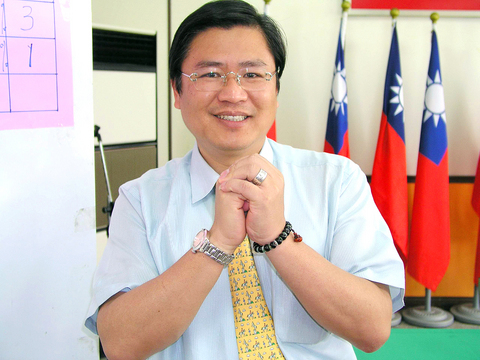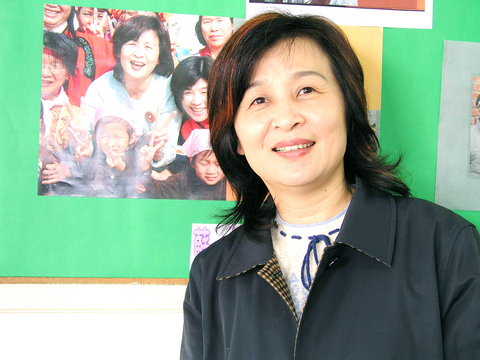The Chinese Nationalist Party's (KMT) five-decade rule of agricultural Yunlin County may come to an end in Saturday's elections. The Democratic Progressive Party (DPP) are determined to win the local-chief elections and their candidate has put forward a number of practical agricultural policies aimed at turning Taiwan's poorest county, a place plagued by a culture of "black gold" and vote-buying, into a bright and prosperous agricultural center.
Abrupt end
The KMT's rule ended abruptly last December, when former county commissioner Chang Jung-wei (張榮味) was arrested on charges of alleged corruption involving a waste-incinerator construction project. Since then, the county's leadership has been in the hands of Li Chin-yung (李進勇), a DPP member who was appointed by the central government to replace Chang.

Saturday's elections will see KMT representative Hsu Shu-po (許舒博), a 43-year-old fourth-term legislator, and the DPP's Su Chih-fen (蘇治芬), a 53-year-old former legislator whose family has a long history in the politics of Yunlin, fight it out for control of the county.
A keenly fought competition is expected on Dec. 3 as several recent polls carried out by different media groups suggest that Su is slightly ahead.
In Yunlin's past, local factions have played a decisive role in many elections. Results of past elections have shown that the support of Chang's faction, disunited since his arrest, will play a key factor in any election victory.

To unite the factions into supporting the KMT, Chairman Ma Ying-jeou (馬英九) has visited Yunlin several times to take part in Hsu's campaign activities. Hsu reportedly said that he has more than 70 percent support from former-commissioner Chang's voter base.
However, the DPP is also busy throwing its weight behind their candidate, Su. President Chen Shui-bian (陳水扁) has visited Yunlin four times this month and has helped to sell Su's policies about turning Yunlin into Taiwan's most competitive agricultural county, or its "Agricultural Capital."
In the 20 townships of Yunlin County, cropland makes up over 68 percent of the total land area. The local farmers' irrigation associations dominate proceedings during elections.
Fallow-fields policy
Since Taiwan joined the WTO in 2002, a compulsory fallow-field policy has been implemented to avoid creating a surplus of fruit and vegetables and to help tackle water shortage problems.
Farmers in more than 10 of the county's townships have been affected. Meanwhile, randomly reported cases of heavy metal pollution in many paddy fields have highlighted the plight of the county's agriculture.
"Yunlin's roots lie in agriculture. An ideal local government would help to technically upgrade it, modernize it and internationalize it," Su said during a press conference two weeks ago.
Wu Ming-ming (吳明敏), a marketing professor at National Chung Hsing University, told the Taipei Times that Su's policies, if implemented well via the local government, might practically improve the lives of the region's poor farmers.
Wu, who is also an agricultural consultant to the Taiwan Thinktank, said, "However, the county will have to pay substantially during the transition. For example, ensuring sufficient selling channels and the safety of agricultural products relies on regulatory reforms."
KMT candidate Hsu's policies rely on the speeding up the development of the Yunlin offshore industrial park. The former KMT-led local government had worked with the central government to carry out projects ensuring water and electricity supplies.
Major investment
Hsu advocates major investment, including a steel mill project from the Formosa Plastics Group, which will require a 600-hectare plot of land. The group has already built one petrochemical complex in the area.
"The development of an offshore industrial park may provide a boost for the local economy, but many of the new job opportunities created would not be for locals," Wu said.

Alain Robert, known as the "French Spider-Man," praised Alex Honnold as exceptionally well-prepared after the US climber completed a free solo ascent of Taipei 101 yesterday. Robert said Honnold's ascent of the 508m-tall skyscraper in just more than one-and-a-half hours without using safety ropes or equipment was a remarkable achievement. "This is my life," he said in an interview conducted in French, adding that he liked the feeling of being "on the edge of danger." The 63-year-old Frenchman climbed Taipei 101 using ropes in December 2004, taking about four hours to reach the top. On a one-to-10 scale of difficulty, Robert said Taipei 101

Nipah virus infection is to be officially listed as a category 5 notifiable infectious disease in Taiwan in March, while clinical treatment guidelines are being formulated, the Centers for Disease Control (CDC) said yesterday. With Nipah infections being reported in other countries and considering its relatively high fatality rate, the centers on Jan. 16 announced that it would be listed as a notifiable infectious disease to bolster the nation’s systematic early warning system and increase public awareness, the CDC said. Bangladesh reported four fatal cases last year in separate districts, with three linked to raw date palm sap consumption, CDC Epidemic Intelligence

Taiwanese and US defense groups are collaborating to introduce deployable, semi-autonomous manufacturing systems for drones and components in a boost to the nation’s supply chain resilience. Taiwan’s G-Tech Optroelectronics Corp subsidiary GTOC and the US’ Aerkomm Inc on Friday announced an agreement with fellow US-based Firestorm Lab to adopt the latter’s xCell, a technology featuring 3D printers fitted in 6.1m container units. The systems enable aerial platforms and parts to be produced in high volumes from dispersed nodes capable of rapid redeployment, to minimize the risk of enemy strikes and to meet field requirements, they said. Firestorm chief technology officer Ian Muceus said

MORE FALL: An investigation into one of Xi’s key cronies, part of a broader ‘anti-corruption’ drive, indicates that he might have a deep distrust in the military, an expert said China’s latest military purge underscores systemic risks in its shift from collective leadership to sole rule under Chinese President Xi Jinping (習近平), and could disrupt its chain of command and military capabilities, a national security official said yesterday. If decisionmaking within the Chinese Communist Party has become “irrational” under one-man rule, the Taiwan Strait and the regional situation must be approached with extreme caution, given unforeseen risks, they added. The anonymous official made the remarks as China’s Central Military Commission Vice Chairman Zhang Youxia (張又俠) and Joint Staff Department Chief of Staff Liu Zhenli (劉振立) were reportedly being investigated for suspected “serious